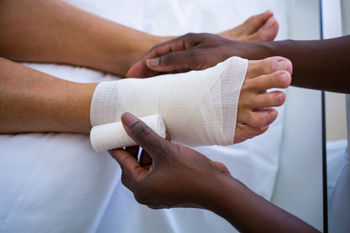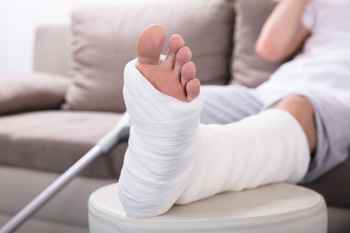December 2020
Signs That Foot Wounds Should Be Checked
 An ulcer that develops on the foot is a wound that may not heal. This type of ailment can cause severe pain and discomfort and is common among diabetic patients. Redness on and around the affected area is often the first sign of a foot wound, and additional symptoms can include an unpleasant odor and possible drainage. There are several reasons why foot wounds may occur. These can consist of living a sedentary lifestyle, nerve damage, or circulation problems. Additionally, medical conditions such as high blood pressure and diabetes may make developing wounds on the feet more likely. If you are prone to foot wounds, it is strongly suggested that you are under the care of a podiatrist who can effectively treat this problem.
An ulcer that develops on the foot is a wound that may not heal. This type of ailment can cause severe pain and discomfort and is common among diabetic patients. Redness on and around the affected area is often the first sign of a foot wound, and additional symptoms can include an unpleasant odor and possible drainage. There are several reasons why foot wounds may occur. These can consist of living a sedentary lifestyle, nerve damage, or circulation problems. Additionally, medical conditions such as high blood pressure and diabetes may make developing wounds on the feet more likely. If you are prone to foot wounds, it is strongly suggested that you are under the care of a podiatrist who can effectively treat this problem.
Wound care is an important part in dealing with diabetes. If you have diabetes and a foot wound or would like more information about wound care for diabetics, consult with Dr. Anna Petrov from Family Foot & Ankle Care. Our doctor will assess your condition and provide you with quality foot and ankle treatment.
What Is Wound Care?
Wound care is the practice of taking proper care of a wound. This can range from the smallest to the largest of wounds. While everyone can benefit from proper wound care, it is much more important for diabetics. Diabetics often suffer from poor blood circulation which causes wounds to heal much slower than they would in a non-diabetic.
What Is the Importance of Wound Care?
While it may not seem apparent with small ulcers on the foot, for diabetics, any size ulcer can become infected. Diabetics often also suffer from neuropathy, or nerve loss. This means they might not even feel when they have an ulcer on their foot. If the wound becomes severely infected, amputation may be necessary. Therefore, it is of the upmost importance to properly care for any and all foot wounds.
How to Care for Wounds
The best way to care for foot wounds is to prevent them. For diabetics, this means daily inspections of the feet for any signs of abnormalities or ulcers. It is also recommended to see a podiatrist several times a year for a foot inspection. If you do have an ulcer, run the wound under water to clear dirt from the wound; then apply antibiotic ointment to the wound and cover with a bandage. Bandages should be changed daily and keeping pressure off the wound is smart. It is advised to see a podiatrist, who can keep an eye on it.
If you have any questions, please feel free to contact one of our offices located in Wheeling and Chicago, IL . We offer the newest diagnostic and treatment technologies for all your foot care needs.
Stress Fractures in the Feet
Stress fractures are small cracks that occur in the bones, typically due to repetitive overuse or injury. The small bones of the feet are often affected. Symptoms of a stress fracture in the foot include pain that worsens with activity and lessens when at rest, tenderness, and bruising around the site of the fracture. Stress fractures usually don’t cause obvious swelling, but some mild swelling may occur at the top of the foot or on the outside of the ankle. A stress fracture can be diagnosed through physical examination. Sometimes, imaging studies may be required. An X-ray will often not pick up on the fracture because it’s so small, so the doctor may request a bone scan or an MRI instead. If you believe that you may have a stress fracture in your foot, it is suggested that you seek the care of a podiatrist.
Activities where too much pressure is put on the feet can cause stress fractures. To learn more, contact Dr. Anna Petrov from Family Foot & Ankle Care. Our doctor can provide the care you need to keep your pain free and on your feet.
Dealing with Stress Fractures of the Foot and Ankle
Stress fractures occur in the foot and ankle when muscles in these areas weaken from too much or too little use. The feet and ankles then lose support when walking or running from the impact of the ground. Since there is no protection, the bones receive the full impact of each step. Stress on the feet can cause cracks to form in the bones, thus creating stress fractures.
What Are Stress Fractures?
Stress fractures occur frequently in individuals whose daily activities cause great impact on the feet and ankles. Stress factors are most common among:
- Runners
- People affected with Osteoporosis
- Tennis or basketball players
- Gymnasts
- High impact workouts
Symptoms
Pain from the fractures occur in the area of the fractures and can be constant or intermittent. It will often cause sharp or dull pain with swelling and tenderness. Engaging in any kind of activity which involves high impact will aggravate pain.
If you have any questions please feel free to contact one of our offices located in Wheeling and Chicago, IL . We offer the newest diagnostic and treatment technologies for all your foot and ankle needs.
Heel Pain Can Be Treated!
How Should I Trim My Toenails to Prevent Ingrown Nails?
 Ingrown toenails are a potentially painful condition in which the corner of a toenail, typically the nail on the big toe, grows into the surrounding skin instead of over it. This can cause pain, swelling, and redness. In more severe cases, the area may become infected. Risk factors for developing ingrown toenails include repetitive injury to the toe or nail, wearing shoes that are too tight and restrictive, and improperly trimming the toenails. To reduce the risk of getting an ingrown toenail, it is important to trim the toenails straight across using toenail clippers. The corners of the nail should not be rounded off, and the edge of the nail should still be long enough to hang past the point where your toenail attaches to the toe. If you are prone to developing ingrown toenails, it is suggested that you consult with a podiatrist, who can treat this condition and help you prevent ingrown toenails in the future.
Ingrown toenails are a potentially painful condition in which the corner of a toenail, typically the nail on the big toe, grows into the surrounding skin instead of over it. This can cause pain, swelling, and redness. In more severe cases, the area may become infected. Risk factors for developing ingrown toenails include repetitive injury to the toe or nail, wearing shoes that are too tight and restrictive, and improperly trimming the toenails. To reduce the risk of getting an ingrown toenail, it is important to trim the toenails straight across using toenail clippers. The corners of the nail should not be rounded off, and the edge of the nail should still be long enough to hang past the point where your toenail attaches to the toe. If you are prone to developing ingrown toenails, it is suggested that you consult with a podiatrist, who can treat this condition and help you prevent ingrown toenails in the future.
Ingrown toenails can become painful if they are not treated properly. For more information about ingrown toenails, contact Dr. Anna Petrov of Family Foot & Ankle Care. Our doctor can provide the care you need to keep you pain-free and on your feet.
Ingrown Toenails
Ingrown toenails occur when a toenail grows sideways into the bed of the nail, causing pain, swelling, and possibly infection.
Causes
- Bacterial infections
- Improper nail cutting such as cutting it too short or not straight across
- Trauma to the toe, such as stubbing, which causes the nail to grow back irregularly
- Ill-fitting shoes that bunch the toes too close together
- Genetic predisposition
Prevention
Because ingrown toenails are not something found outside of shoe-wearing cultures, going barefoot as often as possible will decrease the likeliness of developing ingrown toenails. Wearing proper fitting shoes and using proper cutting techniques will also help decrease your risk of developing ingrown toenails.
Treatment
Ingrown toenails are a very treatable foot condition. In minor cases, soaking the affected area in salt or antibacterial soaps will not only help with the ingrown nail itself, but also help prevent any infections from occurring. In more severe cases, surgery is an option. In either case, speaking to your podiatrist about this condition will help you get a better understanding of specific treatment options that are right for you.
If you have any questions please feel free to contact one of our offices located in Wheeling and Chicago, IL . We offer the newest diagnostic and treatment technologies for all your foot and ankle needs.
What Are the Symptoms of Acute Gout?
An acute gout attack can occur when uric acid builds up in the synovial fluid around the joints, forming crystals that cause the joint to swell and become inflamed. Gout attacks can be very painful, and typically affect only one or a few joints at a time. The joints most frequently affected are those of the big toe, ankle, or knee. Pain tends to have a sudden onset, often at night, and can be severe. The affected joint may be warm, red, tender, and swollen. Sometimes, acute gout is accompanied by a fever. The attack may subside after a few days, but may then occasionally return. If you are experiencing the symptoms of gout in the joints of your feet and ankles, it is suggested that you seek the care of a podiatrist.
Gout is a foot condition that requires certain treatment and care. If you are seeking treatment, contact Dr. Anna Petrov from Family Foot & Ankle Care. Our doctor will treat your foot and ankle needs.
What Is Gout?
Gout is a type of arthritis caused by a buildup of uric acid in the bloodstream. It often develops in the foot, especially the big toe area, although it can manifest in other parts of the body as well. Gout can make walking and standing very painful and is especially common in diabetics and the obese.
People typically get gout because of a poor diet. Genetic predisposition is also a factor. The children of parents who have had gout frequently have a chance of developing it themselves.
Gout can easily be identified by redness and inflammation of the big toe and the surrounding areas of the foot. Other symptoms include extreme fatigue, joint pain, and running high fevers. Sometimes corticosteroid drugs can be prescribed to treat gout, but the best way to combat this disease is to get more exercise and eat a better diet.
If you have any questions please feel free to contact one of our offices located in Wheeling and Chicago, IL . We offer the newest diagnostic and treatment technologies for all your foot and ankle needs.









